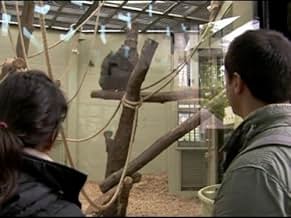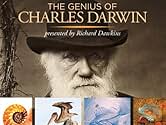Episode 1, Dawkins takes a group of school children to task for their sceptical response to his evolution lesson. He then covers some biographical detail surrounding Darwin's voyage of the beagle and draws on modern research into genetics as well as the older fossil evidence to argue convincingly in support of evolution.
In episode 2 Dawkins explores the social implications of Darwinism, he examines the way it was taken and used to justify right wing politics. Competition they argued has been shown to be the natural order, lets copy this model, let the strongest thrive and do not waste your time trying to help the weak, over time a healthier stronger society will emerge and the most able people will thrive. Dawkins who himself had his own book "the selfish gene" misunderstood and exploited rejects this interpretation of Darwinism. He points out the many social aspects in primate behaviour, as well as visiting a group of women looking for sperm donors, kindness it turns out is just as important to them in selecting a mate as health and ability. The episode though doesn't really address the prickly questions out there. Is war and genocide also a result of our biological urges from our evolutionary past? Dawkins doesn't seem to think so but worryingly doesn't really have an argument against this point of view. Evolution, for him, it seems is allowed to take credit for our positive mental attributes but not the negative ones.
Episode 3 goes to pieces, Dawkins appears before creationist after creationist, he refutes their arguments though they carry on regardless, some of them are truly bizarre people and they are by no means all Americans. The people who Dawkins takes on are pretty light weight and I found it odd how their answers would be faded out and narrated over by Dawkins himself who would speak over them in a slightly self-satisfied voice-over. It's comes across as not only unintentionally funny but it also creates the impression that he's trying to shut them up or hide something. Exasperated by the revival of biblical literalism Dawkins next visits the Archbishop of Canterbury who tells Dawkins that he's quite happy with Darwin's ideas and that evolution has proved no real threat to the established church. Dawkins however is equally unsatisfied with this response and races off in his car to see his good friend the philosopher Daniel Dennett. For a man who at times seems to have little patience with philosophers strangely there's a touch of almost reverence in Dawkins voice when he speaks of his friend. Dawkins finishes the episode by using a quote from Darwin to help reinforce his atheist views, he conveniently neglects to mention those occasions when Darwin indicated that science and faith were compatible, such as his letter to Asa Gray, it's naturally left out of the programme of course because it doesn't fit with his agenda.
Overall I thought this was a bit of a missed opportunity for Dawkins to set out what the theory of evolution is, what evidence there is for it, the history of the theory and how it changes of perspective on the natural world and ourselves. Anybody who's read his book Climbing Mount Improbable will be left with no doubt about his skill in explaining complex ideas to the layman. Dawkins knows his stuff and his passion is second to none but unfortunately there's a tendency to go off in tangents. When it comes to episodes two and three you also get the feeling that there's a certain destination that he's determined to arrive at and will make the evidence fit this worldview. Some of the cinematography too is also a little bad, during the interviews the camera seems a bit shaky. Dawkins is also made the real focus of the show rather than Darwin, he clearly sees himself as Darwin's successor, a man on an unstoppable quest for the scientific truth which he in turn will relay back to us. The three episodes are full of shots of Dawkins rather than Darwin, Dawkins walking, Dawkins sitting, Dawkins meeting his fans, Dawkins reading, Dawkins staring into the distance, Dawkins shaking his head & lamenting the fact that the rest of the planet is not as rational as he is. In spite of some the presentational flaws, the subject matter of Darwin's theory is fascinating and Dawkins introduces us to a range of experts. For a complete account of Darwin's life and theory though I'd recommend the BBC's 'Charles Darwin and the Tree of Life.'





















